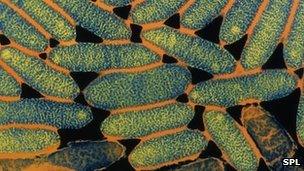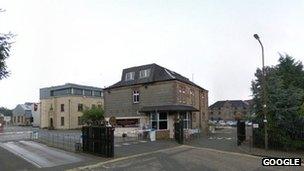Edinburgh Legionnaires' outbreak: 82 confirmed and suspected cases
- Published

Legionella bacteria is commonly found in sources of water
The number of confirmed and suspected cases of Legionnaires' disease in Edinburgh has risen slightly to 82.
Figures released on Sunday showed one new confirmed case and one further person suspected of having the disease.
It is the smallest daily increase since the outbreak was officially acknowledged a week ago.
One man has died in the outbreak. He was Robert Air, who worked on a construction site in the west of the city.
The latest figures show 37 confirmed cases and 45 suspected, with 15 people in intensive care and 26 on general wards.
A total of 16 cases are being treated in the community and 19 have been discharged from hospital.
Five cases are being treated outwith the NHS Lothian area. One patient the north of England, two in NHS Tayside, one in NHS Lanarkshire and one patient from NHS Highland is now being treated in Glasgow.
The Health and Safety Executive and Edinburgh City Council are continuing their investigations into the possible source of the outbreak.
Cooling towers have been shut down at a whisky distillery in the south west of the city.
The Health and Safety Executive served an improvement notice on the North British Distillery for alleged failures to adequately control the risk of legionella in one of its towers.
The company said it had taken its towers offline and halted production at its Gorgie plant as a precaution.

Cooling towers at the distillery are among several sites tested in Edinburgh
Health Secretary Nicola Sturgeon said: "These latest figures are reassuring and in line with expectations, and although it is too early to be definite, they do suggest we are now in the later stages of this outbreak.
"All those involved are responding extremely well: NHS Lothian services are coping with the demands on them and the City of Edinburgh Council and the Health and Safety Executive continue to make significant progress in their investigation to identify the source of this outbreak."
Dr Duncan McCormick, from NHS Lothian, said: "We are pleased with the slow down in the number of cases presenting and we hope this will continue over the coming days."
GPs have been provided with information on spotting the signs of infection and a dedicated NHS helpline has been set up on <bold>0800 0858 531</bold>.
- Published9 June 2012
- Published8 June 2012
- Published6 June 2012
- Published6 June 2012
- Published15 June 2012
- Published4 June 2012